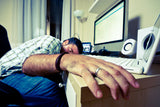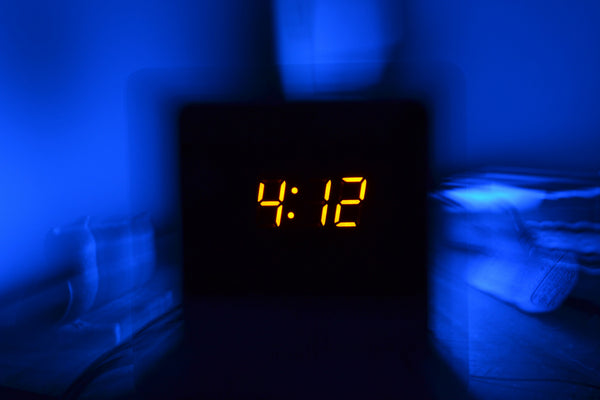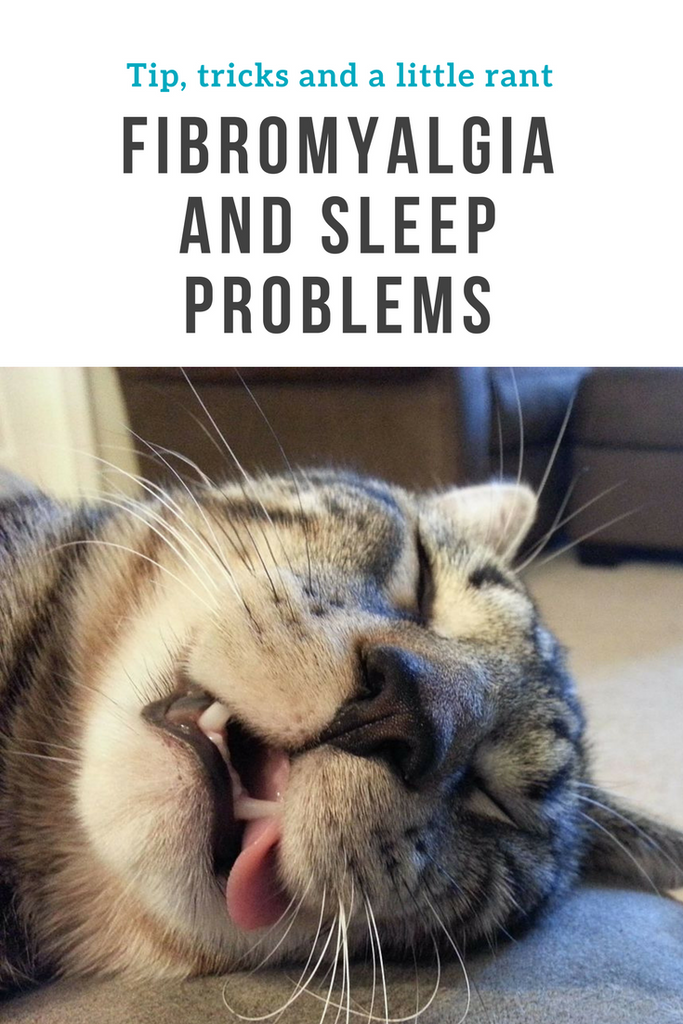Sleep problems are incredibly common for people who have Fibromyalgia
 This sucks. Like being in pain all the time isn’t enough? Sleep deprivation feels like torture to me and it creates a vicious cycle I’ve blogged about before.
This sucks. Like being in pain all the time isn’t enough? Sleep deprivation feels like torture to me and it creates a vicious cycle I’ve blogged about before. It seems that no matter how long you stay in bed for, you never feel rested or refreshed. Most of the time, those who have Fibromyalgia wake up feeling like they were hit by a truck. What a way to start the day! (Yes, I’m a little angry at this disease).
What's the big deal with sleep?
Sleep allows the body to repair damaged tissue. Dreaming might promote good mental and physical health. Growth hormones are secreted when you sleep or shortly before waking. Lack of REM sleep (deep sleep) might affect your stress hormone production.Studies from the UK show that for adults over 50, non-restorative sleep is connected to onset of widespread pain. That is of course a hallmark of Fibromyalgia. So, you can see, it’s very, very important to focus on getting good sleep. It won’t cure your Fibromyalgia but should improve pain and daytime fatigue.
Why sleeping with Fibromyalgia is so hard
First of all, you can have insomnia. That means it’s very difficult to fall asleep and/or stay sleeping. In the mornings, you remember waking up frequently. Sometimes not getting back to sleep for a few minutes (sometimes longer). And please note: some nights you wake up often during the night and DON’T remember it happening. So, you’ve been tossing and turning, half asleep. This means you’re not getting the rejuvenating deep REM sleep you need.
Then comes the brain fog
So, we’ve established that the mind and body don’t get enough rest if you have Fibromyalgia. Well, it gets even better. Mix that with constant pain and you get the not-so-great brain fog. Some people call it fibro fog. I think that to other people it may looks as if we’re stoned. We stop in the middle of sentences because we lose track of our thoughts. We can’t concentrate on anything. We put our phones in the refrigerator, forget appointments, have a confused look on our faces and say: “I’m sorry, what?” a lot.Having brain fog is very uncomfortable and often embarrassing. Imagine being at an important meeting at work. You're having conversation where you totally blank out. Or imagine forgetting an event at your child’s school. It’s terrible.
To top it off: Anxiety and depression
Having chronic pain and brain fog can lead to depression and/or anxiety. That is something that does NOT help with getting good sleep.So, what helps with getting good sleep if you have fibromyalgia?
There are ways to improve your sleep, even if you have fibromyalgia. Some work better than others and some include medication. I’ve gathered a list of things that have helped me over the years. I'm NOT a doctor or medical professional.Improving sleep when you have fibromyalgia
-
First, consult with your doctor. There are medications and supplements that can help with sleep. Some people don’t tolerate them well but they’re wort a shot.
-
Think about ways to improve your sleep routine and try to switch things up if it isn’t great.
-
Don’t sleep for too long. I know this sounds dumb for people suffering from fibromyalgia and sleep problems. But for me it works. I try not to linger in bed and force myself to wake up in the morning even if I don’t have to. I don’t take naps during the day because then I won’t be able to fall asleep. It took a huge effort to change this because I was a napper 😊. My new sleep pattern of going to bed before 11 pm and getting up at around 7-8 am has improved the quality of my night sleep.
-
Write a sleep diary for a few weeks. This will help you see if there are patterns. You might find that something specific is interfering with your sleep. If you have a smart watch that tracks your sleep, use the statistics from it.
-
Learn relaxation techniques and use them before you go to bed. There are loads of techniques. Most of them focus on deep breathing, relaxing muscles etc. They can help you fall asleep. Especially if you’re the anxious type, like me. I use them to keep my mind of stressful or worrying things. Sometimes I find guided meditations on YouTube and they usually knock me right out. The soothing voices and music … zzzz…
-
Try not to discuss emotional issues before bed and avoid getting into arguments before you go to bed.
-
Exercise helps me. I don’t like doing it right before bed but do it earlier in the day. Try taking a walk after dinner (as long as your body can handle) and see if it helps. It should help, it’s science.
-
Try doing some easy yoga exercises and stretches before bed.
-
Taking a hot bath before bed is very relaxing.
-
Read a book in bed instead of looking at a TV or computer screen. It’s been proven that staying away from electronics and screens for an hour before bed helps. The reason is that the light from the screens interfere with melatonin production.
-
If you have many tender trigger points, try massaging them before bed with a massage device or even a tennis ball.
-
Make sure there aren’t environmental factors bugging you. Is light creeping in through the window? Get better curtains. Are there sounds waking you up? Try ear plugs or other ways to dampen noises. Are you too hot or too cold? Find ways to keep the temperature in your bedroom just right. Usually it’s better to keep it on the cool side but not so you’re freezing.
-
Make sure you’re not hungry or thirsty when you go to bed, but don’t eat a huge meal or drink a lot just before bedtime. A glass of milk might be beneficial. Milk contains L-tryptophan, an amino acid that helps you fall asleep.
-
If you get up in the night, don’t turn on any lights and use a night light instead. If you can’t fall asleep again, don’t check your phone or turn on the TV.
-
Keep your bed to yourself. Ok, don’t kick your spouse out, but no kids and no pets in bed. They´ll disturb your sleep when they move.
-
Try not to engage in anything mentally straining for an hour before bed. Relax.
-
Stay clear of caffeine in the afternoon and evening. I’m a huge caffeine addict and this is VERY hard for me. But I feel a difference if I switch to water or caffeine free tea after 5 pm or at least 6 hours before bedtime. I had to gradually cut back because I got a withdrawal headache. Please note that some medication contains caffeine.
-
Same goes for nicotine and chocolate since they’re both stimulants.
-
Also, stay clear of alcohol. You might THINK it relaxes you, and it does in the short term. But using it to help with stress will harm you in the long run. When your metabolism is removing it from your body at night you get withdrawal symptoms. They can cause sweats and nightmares.
-
Get comfortable in bed. It’s important to have a good mattress. I like the tempur mattresses because I can’t feel a thing and stay still even if my husband is tossing and turning.
-
Of course, we recommend our Snoozle slide sheet! It makes it easier for you to roll over in bed without putting too much strain on your joints and muscles. Our customers tell us they wake up less frequently during the night. It takes a lot less effort to move in bed with the Snoozle. I’ve used it myself for years and I can’t sleep without it now.
I know that all the things I listed are small in the grand scheme of things, but they add up. Trust me. I've personally seen a huge improvement of Fibromyalgia symptoms. All because I started using these tricks and put an effort into improving my sleep.
Good luck 😊


